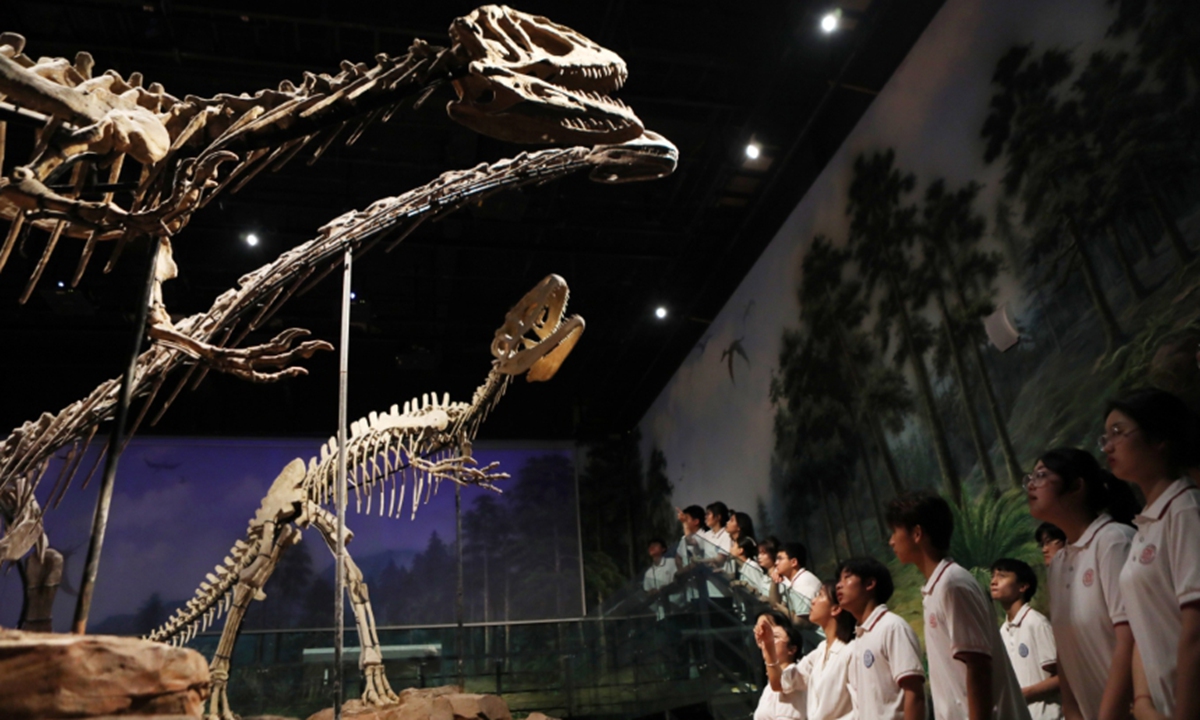
Students inspect dinosaur skeletons in a museum on May 14, 2024 in Southwest China's Chongqing Municipality, ahead of International Museum Day, which is celebrated on May 18 every year. Photo: VCG
The Chinese Museums Association has recently announced a list of 123 museums nationwide that are set to be named national first-class museums in China.
These museums are scattered in different provinces and autonomous regions such as Henan, Hunan and Sichuan. The majority of them can be classified as "themed museums" focusing on "Chinese history, industrial and cultural heritage, folk traditions and archaeology," museum expert Zhang Liming told the Global Times.
The list incorporates several war history-related sites such as the Memorial Museum of the Huaihai Campaign in Jiangsu Province and the Exhibition Hall of Evidences of Crime Committed by Unit 731 of the Japanese Imperial Army in Heilongjiang Province.
Bei Jiekai, a Shanghai-based cultural resource management expert, told the Global Times that war history museums "play a prominent role in the country's patriotic public education." He also added that those museums should be supervised even more "strictly" than other sites displaying cultural artifacts.
"To achieve their educational purpose, exhibited items at these museums should be coordinated with correct historical references and explanations that can reinterpret real history. Those are bedrock principles," Bei remarked.
Taking the major event of the War of Resistance against Japanese Aggression (1931-45) as an example, in 2019, China designated a total of 80 national-level sites dedicated to the war across the country. Many of them were also national patriotic educational bases partnering with educational institutions like primary schools and universities.
To encourage further contributions by the country's archaeological history, several ancient ruins museums were also put on the recent list. The Erlitou Site Museum of the Xia Capital in Henan Province and the Liangzhu Museum in Zhejiang Province are two standouts.
As a supporting facility for the Erlitou site, the museum in Henan Province hosts precious relics revealing how ancient urbanism and power regimes were established during the Xia (c.2070BC-c.1600BC) and Shang (c.1600BC-1046BC) dynasties. In Hangzhou, the Liangzhu Museum is an embodiment of ancient Chinese ingenuity in jade handicrafts.
Meanwhile, the Erlitou Site Museum of the Xia Capital has a research center for China's national project to trace the origins of Chinese civilization. Zhang told the Global Times that for archaeological museums, research is often more important than holding exhibitions.
"Many of those museums are established right on the original ruins site, and they should have professional teams and equipment to make new discoveries," Zhang emphasized.
The 123 museums on the list are scheduled to become the country's fifth batch of national first-class museums. Prior to this, a total of 204 museums, including the prestigious Palace Museum in Beijing, have been honored with "first-class" status.
Luo Wenli, deputy director of China's National Cultural Heritage Administration, revealed that the final list of the fifth batch of national first-level museums will be released on Saturday at a celebratory event for International Museum Day at the Shaanxi History Museum's Qin Han Museum.
Considering museums' responsibility to improve public cultural services and research, the final list will be announced on International Museum Day 2024 as its main theme will be "Museums for Education and Research."
Held annually on May 18, International Museum Day is a global effort to explore how museum facilities around the world contribute to people's cultural lives and interpret social changes contextualized against different cultural backgrounds. The event's theme changes every year. In 2023, its theme was "Museums, Sustainability and Well-being."
The Qin Han Museum, China's main venue for International Museum Day, will be officially opened that day.
According to Luo, the opening ceremony will include several significant announcements, such as unveiling the latest data on the development of China's museum sector in 2023, the Ministry of Education jointly awarding 20 national revolutionary cultural relic coordination centers, the launch of the theme exhibition Reading China in Museums in collaboration with the Cyberspace Administration of China, and announcing the "Top 10 National Museum Exhibitions."




